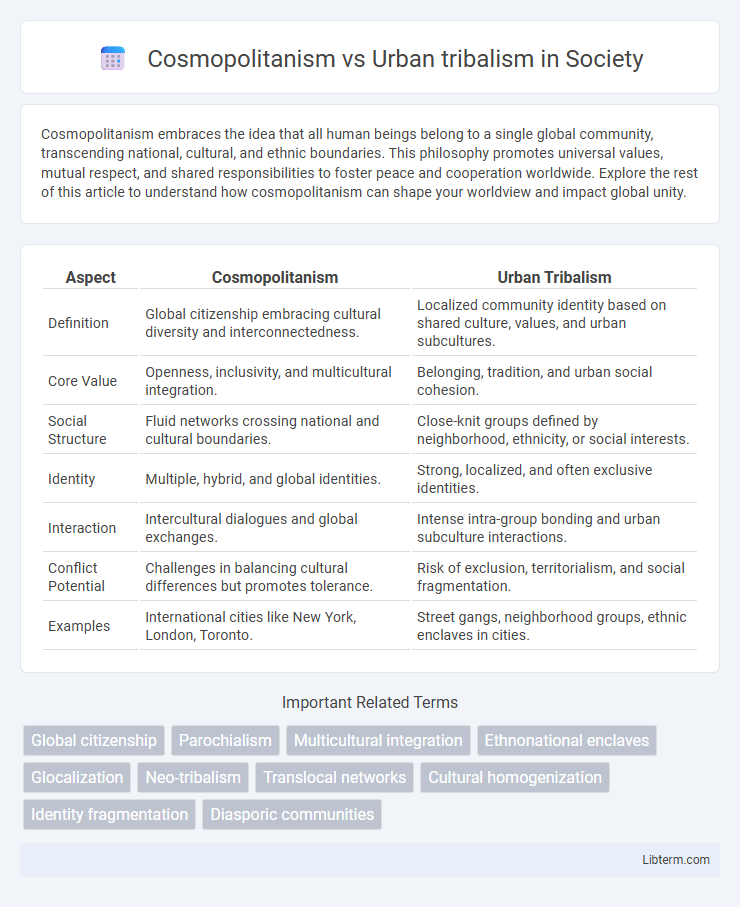Cosmopolitanism embraces the idea that all human beings belong to a single global community, transcending national, cultural, and ethnic boundaries. This philosophy promotes universal values, mutual respect, and shared responsibilities to foster peace and cooperation worldwide. Explore the rest of this article to understand how cosmopolitanism can shape your worldview and impact global unity.
Table of Comparison
| Aspect | Cosmopolitanism | Urban Tribalism |
|---|---|---|
| Definition | Global citizenship embracing cultural diversity and interconnectedness. | Localized community identity based on shared culture, values, and urban subcultures. |
| Core Value | Openness, inclusivity, and multicultural integration. | Belonging, tradition, and urban social cohesion. |
| Social Structure | Fluid networks crossing national and cultural boundaries. | Close-knit groups defined by neighborhood, ethnicity, or social interests. |
| Identity | Multiple, hybrid, and global identities. | Strong, localized, and often exclusive identities. |
| Interaction | Intercultural dialogues and global exchanges. | Intense intra-group bonding and urban subculture interactions. |
| Conflict Potential | Challenges in balancing cultural differences but promotes tolerance. | Risk of exclusion, territorialism, and social fragmentation. |
| Examples | International cities like New York, London, Toronto. | Street gangs, neighborhood groups, ethnic enclaves in cities. |
Defining Cosmopolitanism: Global Citizenship
Cosmopolitanism defines global citizenship as an ethical framework where individuals see themselves as members of a worldwide community, transcending local or national identities. This concept emphasizes openness to cultural diversity, global responsibility, and active engagement in international issues. By promoting interconnectedness and mutual respect, cosmopolitanism fosters inclusive attitudes essential for addressing global challenges.
Understanding Urban Tribalism: Roots and Realities
Urban tribalism emerges from shared identities and localized cultural practices within metropolitan areas, fostering tight-knit communities that contrast with the broader inclusivity of cosmopolitanism. Rooted in social bonding and common experiences, urban tribes often prioritize belonging and distinctiveness over global interconnectedness. This phenomenon reflects the complexities of urban life, where individuals seek both connection and identity amidst diverse city landscapes.
Historical Evolution of Cosmopolitanism
The historical evolution of cosmopolitanism traces back to ancient Greek philosophy, where thinkers like Diogenes and Stoics promoted the idea of a universal human community transcending local identities. During the Enlightenment, cosmopolitan ideals expanded through increased global trade, colonialism, and the spread of ideas emphasizing human rights and citizenship beyond national borders. Modern cosmopolitanism integrates multiculturalism and global interconnectedness, contrasting with urban tribalism's focus on localized, identity-based social groups within metropolitan settings.
The Rise of Urban Tribalism in Modern Cities
The rise of urban tribalism in modern cities reflects a shift from cosmopolitanism, emphasizing global interconnectedness, to localized identity groups centered on shared culture, lifestyle, and values. Urban tribalism promotes social cohesion within smaller, homogenous communities, often defined by ethnicity, profession, or interests, contrasting cosmopolitan ideals of diversity and pluralism. This phenomenon shapes urban social dynamics by increasing neighborhood solidarity but can also contribute to social fragmentation and reduced intergroup interaction.
Social Cohesion: Unity or Fragmentation?
Cosmopolitanism fosters social cohesion by promoting inclusivity and shared global identities, encouraging unity across diverse cultural backgrounds. Urban tribalism, in contrast, often leads to social fragmentation as individuals align with smaller, insular groups based on ethnicity, lifestyle, or interests, which can create parallel societies within cities. The tension between these paradigms influences urban social dynamics, impacting community trust, participation, and collective resilience.
Economic Impacts: Global Networks vs Local Loyalties
Cosmopolitanism drives economic growth by leveraging global networks that facilitate international trade, investment, and innovation, enabling cities to attract diverse talent and capital flows. Urban tribalism, emphasizing local loyalties and community-based economies, fosters strong support for small businesses and local supply chains, boosting resilience and social cohesion. Balancing these forces influences regional economic sustainability, with cosmopolitan spheres enhancing global competitiveness and urban tribalism reinforcing grassroots economic stability.
Identity Formation: Inclusivity vs Exclusivity
Cosmopolitanism fosters identity formation through inclusivity, embracing diverse cultural influences and promoting a sense of global belonging that transcends local boundaries. Urban tribalism, by contrast, cultivates identity through exclusivity, reinforcing strong in-group bonds and delineating social categories based on shared experiences, values, or subcultural affiliations. This dynamic shapes social interactions, with cosmopolitan identities encouraging open networks and urban tribes emphasizing loyalty and distinctiveness.
Media Influence: Narratives of Division and Unity
Media influence plays a crucial role in shaping narratives of division and unity within the frameworks of cosmopolitanism and urban tribalism. Global media platforms often promote cosmopolitanism by highlighting shared human experiences and fostering cross-cultural understanding, whereas localized media frequently reinforce urban tribalism by emphasizing community-specific identities and conflicts. These divergent portrayals impact social cohesion by either bridging cultural divides or entrenching group boundaries in urban environments.
Navigating Urban Spaces: Integration Strategies
Cosmopolitanism in urban spaces emphasizes inclusive integration strategies that promote cultural diversity and cross-community interactions, fostering a sense of global citizenship among city residents. Urban tribalism, by contrast, often encourages spatial clustering around shared identities, which can limit broader social integration but strengthen localized networks and cultural coherence. Effective navigation of urban environments requires balancing these approaches through policies that support both multicultural engagement and the preservation of distinct community identities, enhancing social cohesion and urban resilience.
Future Prospects: Balancing Cosmopolitanism and Urban Tribalism
Future prospects for balancing cosmopolitanism and urban tribalism hinge on fostering inclusive urban policies that encourage cultural exchange while preserving distinct community identities. Integrating smart city technologies with participatory governance can enhance social cohesion by facilitating dialogue across diverse groups. Emphasizing education and equitable economic opportunities can mitigate social fragmentation, promoting a hybrid urban environment that values both global interconnectedness and local belonging.
Cosmopolitanism Infographic

 libterm.com
libterm.com